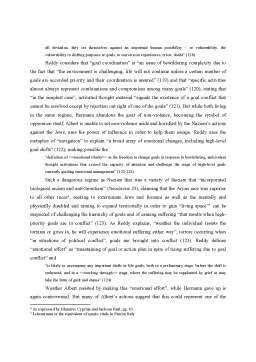Extras din referat
Since the very emergence of the term “emotions” that dates back to the year 1597, controversies have been created around its definition. Thomas Dixon considers that “emotions are everywhere today”, that “being in touch with one’s emotions is, for many, an unquestioned good” (1). He also mentions Reddy’s perception according to which a “revolution” has been created as numerous emotion studies have been carried out in fields such as “philosophy and anthropology” (x). Discussing the definition of emotions, in “The Navigation of Feeling”, Reddy mentions disagreements and uncertainties, referring both to the cultural aspect and the biological construction of the term, but proposes a revolution in the study of emotion, aiming at “elaborating a formal theory that establishes emotions as largely (but not entirely) learned” (ix).
Taking into consideration that it has been argued that “emotions are the most immediate, the most self-evident and the most relevant of our orientation toward life” (Reddy 3), my aim is to analyze the film “The Real Albert Goering” featuring John Kingsley and Nicholas Farr and to try to explain how Albert Goering’s list of thirty-four and his contribution to the Anti-Nazi Movement can be explained through Reddy’s perception according to which emotions represent “goal-relevant activations of thought material that exceed the translating capacity of attention within a short time horizon” (128), emotives represent a form of speech act different from both performative and descriptive utterances that have “broad implications for understanding of social life and politics” (112) and the question asked is “can a person who feels an emotion that is a learned response, a product of social construction, be oppressed – in the political sense of the term – by this feeling?” (114). As emotions are also considered “a byproduct of translating its concerns into goal-directed actions in an unpredictable environment”, Reddy enforcing Clore’s vision according to which “the more an event is seen to affect specific goals, the more intensely one may react in the sense that it may influence emotional feelings and preoccupations over time” in order to account for intense emotions that possess “goal-relevance” (22), I also plan to apply Reddy’s perception that “emotional suffering” occurs “when high-priority goals are in conflict” and “when all available choices seem to counter one or more high-priority goals” (123).
Reddy believes that “any enduring political regime must establish as an essential element a normative order for emotions, an <<emotional regime>>” at one end being “strict regimes which require individuals to express normative emotions and to avoid deviant emotions” and at the other “regimes that use such strict emotional discipline only in certain institutions” (124-125). The strict regime as described by Reddy is characterized through emotions that are “modeled through ceremony or official art forms”, through the fact that individuals are required to utter specific emotives and that those who refuse to do so face “the prospect of severe penalties” that induce “goal conflict” (125). The concentration camps, people being taken away, mocked and killed, war and theft are main features of the Nazi regime, but as Hermann became implicated more and more in crime and terror, Albert continued to help Jews such as the composer Franz Lehar and other and to oppose to the regime. Once with the invasion of Czechoslovakia, Albert begat working for Skoda in Prague, while Hermann handled personally “the Jewish question”. Financing the Czechoslovakian Resistance Movement, trying to sabotage Skoda’s production, moving from Vienna to Prague and Bucharest, he marries a Czech, gets more and more involved in the Resistance’s actions and even determines Heinrich Himmler to want him arrested.
Preview document
Conținut arhivă zip
- The Politics of Emotions and the Anti-Nazi Movement.docx






